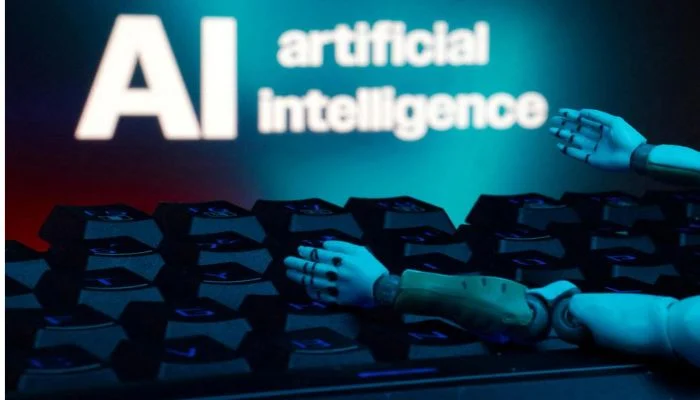Voice artists are struggling to maintain their position in the face of AI-generated voices due to the unprecedented rise of Artificial Intelligence (AI) in the dubbing industry. Numerous actors have urged lawmakers to regulate the use of artificial voices in the industry because they are concerned about AI’s assertive control over human-generated content. The dilemma of human talent
Ben Affleck and Joaquin Pheonix’s French voice actor Boris Rehlinger cautioned against AI’s potential effects on human talent. Voice actors fight back as AI takes over dubbing industry
By Web DeskJuly 31, 2025
AI dubbing sparks outcry from voice actors
Voice actors express outrage at AI dubbing. Voice artists are struggling to maintain their position in the face of AI-generated voices due to the unprecedented rise of Artificial Intelligence (AI) in the dubbing industry. Many actors have raised the concerns regarding the assertive authority of AI over the human-generated content, thereby urging the lawmakers to regulate the use of artificial voices in the industry.
The problem with talent Boris Rehlinger, known as the French voice of Ben Affleck and Joaquin Phoenix, warned against the potential implications of AI for human talent.
The actor is the part of French initiative “TouchePasMaVF” aims to safeguard human-created dubbing from artificial intelligence. Boris expressed his reservations, “I feel threatened even though my voice has not been replaced by AI yet.”
The rising demand for transcription services The rise of global streaming services like Netflix is contributing to the flourishing dubbing industry. The streaming platform relies on dubbing services to make global hits such as Squid Games and Lupin. The increasing reliance has increased the demand for content dubbing. According to Consumer research firm GWI, 43 percent of viewers in Germany, Italy, France, and Britain prefer dubbed content over subtitles.
Business Research Insights also reported that the market is predicted to grow to $4.3 billion in 2025, spiking to $7.6 billion by 2033.
Production companies and streaming giants have switched to AI-assisted dubbing solutions to cut costs and improve production efficiency in response to rising demand. Netflix co-CEO Ted Sarandos has claimed that the company used generative AI to produce visual effects for the first time in the original series El Eternauta.
It has also conducted tests on GenAI to synchronise artists’ lip movements with dubbed dialogues to improve the audience experience.
However, these tests don’t rely on AI solely. In fact, it depends on local voice actors to deliver dialogue. The new actors’ union contract allows for this kind of AI use in dubbing. This contract covers voice-over dubbing from foreign languages into English.
Ongoing efforts to safeguard voice artists’ integrity
Industry groups are striving hard to protect the artistic integrity of voice actors. A campaign in Germany with the slogan “Let’s protect artistic, not artificial intelligence” was started by 12 well-known dubbing actors. Moreover, VDS voice actors association filed a petition, urging EU and German lawmakers to scrutinize AI giants, so these companies obtain explicit consent when training technology on artists’ voices and fairly reimburse them.
VDS also joined hands with United Voice Artists, a global network of 20,000 voice actors, to vouch for transparent contracts, ethical use of AI, and the protection of intellectual property.
Hybrid dubbing
To protect human creativity and reduce production costs, some studios and tech companies are working on hybrid solutions. For instance, Germany’s Neue Tonfilm Muenchen is trying to blend AI with human talent.
The Neue Tonfilm Muenchen’s managing director, Eberhard Weckerle, believes that artificial intelligence and human dubbing can one day coexist. However, the past attempts to bring AI and human creativity on the same table have failed miserably. For example, Viaplay’s AI-dubbed series Murderesses faced backlash on the grounds of lack of emotional depth and poor audio quality.
AI as a way to boost creativity The CEO of Audio Innovation Lab, Stefan Sporn, believes GenAI will reshape or uplift, but not replace voice work.
“Humans will always be needed for scripting, emotion, and language nuance, but just not to the same extent,” he added.
Scott Mann, the co-CEO of Flawless AI, also vouch for the constructive side of AI, “When AI technologies are used in the right way, they are a silver bullet to change how we can film-make in a new way.”
However, these tests don’t rely on AI solely. In fact, it depends on local voice actors to deliver dialogue. Such use of AI for dubbing is allowed under the new SAG-AFTRA actors’ union contract. This contract covers voice-over dubbing from foreign languages into English.
Ongoing efforts to safeguard voice artists’ integrity
Industry groups are striving hard to protect the artistic integrity of voice actors. In Germany, 12 famous dubbing actors initiated a campaign saying “Let’s protect artistic, not artificial intelligence.”
Moreover, VDS voice actors association filed a petition, urging EU and German lawmakers to scrutinize AI giants, so these companies obtain explicit consent when training technology on artists’ voices and fairly reimburse them.
VDS also joined hands with United Voice Artists, a global network of 20,000 voice actors, to vouch for transparent contracts, ethical use of AI, and the protection of intellectual property.
Hybrid dubbing
To protect human creativity and reduce production costs, some studios and tech companies are working on hybrid solutions. For instance, Germany’s Neue Tonfilm Muenchen is trying to blend AI with human talent.
Eberhard Weckerle, managing director of the Neue Tonfilm Muenchen, heralds that AI and human dubbing can one day coexist.
However, the past attempts to bring AI and human creativity on the same table have failedmiserably. For example, Viaplay’s AI-dubbed series Murderesses faced backlash on the grounds of lack of emotional depth and poor audio quality.
AI as a way to boost creativity The CEO of Audio Innovation Lab, Stefan Sporn, believes GenAI will reshape or uplift, but not replace voice work.
“Humans will always be needed for scripting, emotion, and language nuance, but just not to the same extent,” he added.
Scott Mann, the co-CEO of Flawless AI, also vouch for the constructive side of AI, “When AI technologies are used in the right way, they are a silver bullet to change how we can film-make in a new way.”
AI dubbing sparks outcry from voice actors

Categories:



